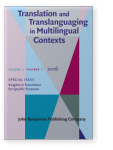An analysis of critical ‘voices’ and ‘styles’ in transpreters’ translations of complainants’ narratives
Monwabisi K. Ralarala | Fundani Centre for Higher Education Development, Cape Peninsula University of Technology
Police officers (hereafter referred to as transpreters) have a fundamental role and function as both ‘interpreters’ and ‘translators’ in the process of the administration of justice. This role and function hinges, oftentimes, on how the two agents, that is, the transpreters and the complainants, relate to each other. What is it that they represent? What do they stand to gain? What mechanisms are at play that they exploit to reach their various goals and desires? In discharging these roles and functions, transpreters in particular become actively engaged in the activities of listening to, visualising, then retelling and rewriting the complainants’ isiXhosa oral narrative text into the English language. All these laborious and tedious activities are conducted to compile sworn statements that become essential in the leading of a criminal investigation, as well as in compiling the evidence that is ultimately used in court. In this context, the ‘voices’ that inform the ‘styles’ in and through which the original narratives are reconstructed (as translations) into police records remain critical as part of the legal discourse in the South African criminal justice system. These ‘voices’ and ‘styles’ signal the extent to which sworn statements are mediated and manipulated.
References (28)
Baker, Mona, ed. 2010. Critical Readings in Translation Studies. New York: Routledge.
Boase-Beier, Jean. 2004. “Knowing and not Knowing: Style, Intention and the Translation of a Holocaust Poem.”Language and Literature 13 (1):25–35.
Chatman, Seymour. 1978. Story and Discourse: Narrative Structure in Fiction and Film. Ithaca: Cornell UP.
Chatman, Seymour. 1990. Coming to Terms. The Rhetoric of Narrative in Fiction and Film. Ithaca: Cornell UP.
Cote, David. 2005. The Right to Language Use in South African Criminal Courts. LLM diss. University of Cape Town.
Eades, Diana. 1997. “Language in Court: The Acceptance of Linguistic Evidence about Indigenous Australians in the Criminal Justice System.” Australian Aboriginal Studies 11:15–27.
Eades, Diana. 2010. Sociolinguistics and the Legal Process. Bristol: Multilingual Matters. 

Heaton-Amstrong, Anthony, and David Wolchover. 1999. “Recording Witness Statements.” In Analysing Witness Testimony: A Guide for Legal Practitioners and Other Professionals, ed. by Anthony Heaton-Armstrong, Eric Shepherd, and David Wolchover, 222–249. London: Blackstone.
Hermans, Theo. 2007. The Conference of the Tongues. Manchester: St. Jerome Publishing.
Hermans, Theo. 2010. “The Translator’s Voice in Translated Narrative.” In Critical Readings in Translation, ed. by Mona Baker, 193–212. New York: Routledge.
Heydon, Georgina. 2004. “Establishing the Structure of Police Evidentiary Interview with Suspects.” Speech
, Language and the Law 11 (1): 27–49.
Koskinen, Kaisa. 1994. “(Mis)Translating the Untranslatable: The Impact of Deconstruction and Post-structuralism Translation Theory.” Meta: Translators’ Journal 39 (3): 446–452. 

May, Rachel. 1994. The Translator in the Text: On Reading Russian Literature in English. Illinois: Northwestern University Press.
Malmkjær, Kirsten. 2004. “Translational Stylistics: Dulcken’s Translations of Hans Christian Andersen.” Language and Literature 13 (1): 13–24. 

Millan-Varela, Carmen. 2004. “Hearing Voices: James Joyce, Narrative Voice and Minority Translation.” Language and Literature 13 (1): 37–54. 

Munday, Jeremy. 2008. “Style and Ideology in Translation: Latin American Writing in English.” Discursive Presence, Voice and Style in Translation, ed. by Jeremy Munday, 11–41. New York: Routledge.
O’Sullivan, Emer. 2003. “Narratology Meets Translation Studies, or, The Voice of the Translator in Children’s Literature.” Meta: Translators’ Journal 48 (1-2): 197–207. 

Ralarala, Monwabisi K. 2012. “A Compromise of Rights, rights of Language and Rights to a Language in Eugene Terreblanche’s (ET) Trial within a Trial: Evidence Lost in Translation.” Stellenbosch Papers in Linguistics 411: 55–70. 

Ralarala, Monwabisi K. 2013. “Meaning Rests in People, Not in Words: Linguistic and Cultural Challenges in a Diverse South African Legal System.” In Multilingualism for Empowerment: Studies in Language Policy in South Africa, ed. by Pol Cuvelier, Theodorus du Plessis, Michael Meeuwis, Reinhild Vandekerckhove, and Vic Webb, 91–102. Pretoria: Van Schaik.
Ralarala, Monwabisi K. 2014. “Transpreters’ Translations of Complainants’ Narratives as Evidence: Whose Version Goes to Court?” The Translator 20 (3): 377–395. 

Rock, Frances E. 2001. “The Genesis of a Witness Statement.” Forensic Linguistics 8 (2): 44–72.
Saldanha, Gabriela. 2011. “Translator Style: Methodological Considerations.” The Translator 17 (1): 25–50. 

Snell-Hornby, Mary. 1995. Translation Studies. Revised ed. Amsterdam: John Benjamins.
Venuti, Lawrence. 1995. The Translator’s Invisibility. A History of Translation. London: Routledge. 

Venuti, Lawrence. 2008. The Translator’s Invisibility. A History of Translation. 2nd ed. London: Routledge.
Cited by (2)
Cited by two other publications
Eades, Diana, Helen Fraser & Georgina Heydon
2023.
Forensic Linguistics in Australia,

Harding, Sue-Ann & Monwabisi K. Ralarala
2017.
‘Tell me the story is and do not leave out anything’. Social responsibility and ethical practices in the translation of complainants’ narratives: the potential for change.
The Translator 23:2
► pp. 158 ff.

This list is based on CrossRef data as of 20 july 2024. Please note that it may not be complete. Sources presented here have been supplied by the respective publishers.
Any errors therein should be reported to them.
